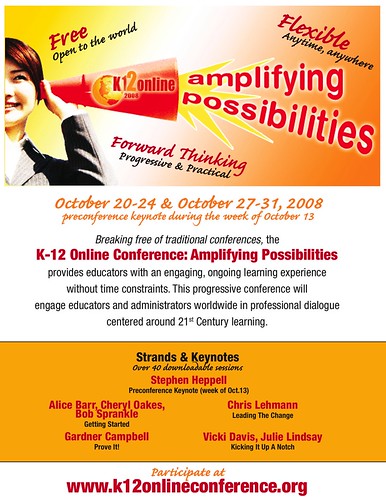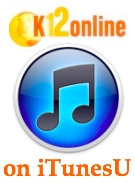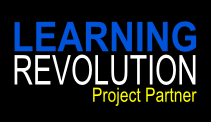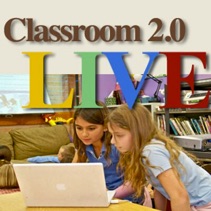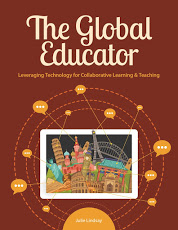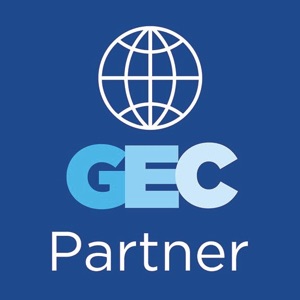Lisa Parisi
Strand: Getting Started
Oh the Possibilities
“What Is School?” Getting Started Keynote Teaser
Alice Barr, Bob Sprankle, Cheryl Oakes
Strand: Getting Started
What is School? (Keynote Presentation)
Feel free to start the conversation about the keynote on Alice, Bob, and Cheryl’s Teaser Voicethread
“What did you do in school today, last month and three years ago?” Teaser
H Songhai
Strand: Getting Started
What did you do in school today, last month and three years ago?
“Traveling Through The Dark” Teaser
Steven Kimmi
Strand: Getting Started
Traveling Through The Dark
“Reading Revolution: New Texts and New Technologies” Teaser
Laurie Fowler
Strand: Getting Started
Reading Revolution: New Texts and New Technologies
“Monsters Bloom in our Wiki” Teaser
Ann Oro and Anna Baralt
Strand: Kicking it Up a Notch
Monsters Bloom in our Wiki
Announcing notK12 Online
K12 Online depends on the collaboration of many people to make this unique conference a success. This year, as we discussed what an online “unconference” might look like, we struck a committee to do some of the heavy lifting and thinking about our online unconference venue, notK12 Online. We asked Bud Hunt to chair the notK12 Online committee and he’s assembled an excellent team of educators to help us figure this out: Jackie Ballarini, Bill Bass, and Marcie T. Hull with substantial technical assistance from Andy Schmitz.
Our thanks to all of them; they’ve done some great work and will be continuing to volunteer their time and energy to help make this extension of K12 Online a blow out success. Here’s what they’ve come up with:
Not K12Online exists as one way to expand, and amplify, the possibilities of the K12Online Conference, to ensure that everyone has a way to add to the conversation(s) started by, inspired by, or missed by, the formal conference. Think of NotK12Online as one aggregator for content related to the possibilities generated by K12Online. To be honest, we hope you don’t need us, and we recognize that you really don’t. But we’re here anyway, a reminder of how you might use the power of digital tools to promote learning wherever, and whenever, you are.
NotK12Online, at this point, consists of two distinct channels of content that we hope you’ll consider submitting to.
Have a presentation you’d like to share relating to one of the four themes of this year’s conference? Check out the details of the “Presentation Channel” below and consider creating a presentation to share. Or not.
The other piece of NotK12Online is the “Critique Channel”. Critically examining our practices is important – as are divergent opinions. We are seeking to foster constructive dialogue about teaching and learning, as well as meta-talk about events like K12Online, in this channel. Submissions to this channel will offer constructive criticism and/or feedback on the K12Online sessions.
In the case of both channels, we’re seeking not to own the conversation, but to provide a venue for folks who would like to connect the work they’re already doing to the conference in an informal way. We’re also interested in your thoughts on what other channels we might’ve missed.
NotK12Online will “run,” meaning we’ll be open for submissions, from October 13th, 2008 until November 16th, 2008. After that, submissions will close, but the links will be around. The idea behind the extended time frame is to provide time for people to reflect upon and continue the conversations that ensue from their K12Online experiences. This also allows people time to create a presentation or critique that may have been inspired by the conference content. Of course, after November 16th, we encourage everyone to continue sharing presentations, discussing and networking, and reflecting on the work of others, but we won’t be the venue for that – we’ll count on you to use the tools of the open Web, as well as the K12Online website, to do so. (We really, really don’t think you need us at all – and yet plenty of good work isn’t ever shared. We hope to be the push that some might need to help them to publish.) We’re still working on our web presence where we’ll be taking submissions and aggregating them, but we wanted you to have a glimpse into what we’re seeking at the moment, both as a chance to get some feedback but also to take the opportuniy to give you a heads up – we hope you’ll consider putting something together. Below are our submission guidelines.
| Presentation Channel: Presentations can be submitted under any of the four themes for K12Online – 2008. The four themes are “Getting Started”, “Kicking It Up a Notch”, “Prove It”, and “Leading the Change” (Read the original strand descriptions here.). Presentations that, in some way, fit the strands of this year’s K12Online conference are welcome.
Guidelines: Critique Channel: Guidelines: |
We welcome your feedback about these guidelines and ideas, as well as NotK12Online itself. Ideally, a conference about self-directed learning should be, in part, about making itself obsolete. We hope NotK12Online will allow for some playing with, and stretching of, the boundaries of an online conference. And we hope you’ll be willing to submit the work that you’re doing to one of our channels. NotK12Online should serve as an amplifier of sorts. That’s all. Perhaps it’ll be the little bit of a push that you need to get moving on sharing some of the work that you’ve been up to. Or, ahem, not.
It’s certainly worth it to try.
As always we’re interested in your thoughts, suggestions and ideas; feel free to comment here and share them.
“Free Tools for Universal Design for Learning in Literacy” Teaser
As in 2007, each week twenty different presentations will be posted here once the conference begins in mid-October. With so many choices, it may be helpful to get a better idea of the issues, tools, and concepts presenters plan to address in their sessions. Our presenters have been invited to create short, online videos (published to a website like YouTube, TeacherTube, etc.) which will give attendees a better idea of what their presentation will address. These “teaser” videos will hopefully generate and pique interest in presentations prior to the actual start of the conference.
Not all actual conference presentations will be shared as online videos. Presenters have freedom to choose their asynchronous publishing format. Conference presentations will be hosted (as in 2007) by the College of William and Mary.
Please take a few moments to let these presenters know how much you appreciate their creativity and are looking forward to their presentations!
Jennifer Kraft
Strand: Getting Started
Free Tools for Universal Design for Learning in Literacy
2008 K-12 Online Conference Marketing Flyer
It’s here! Please share it far and wide: The 2008 K-12 Online Conference marketing flyer! (PDF format) Many thanks to the K12Online08 PR committee!
Technorati Tags:
k12online08, k12online, marketing, flyer, advertising
Announcing K12 Online 2008 Presenters
The 2006 and 2007 K-12 Online Conferences provided outstanding opportunities for free, collaborative, accessible professional learning for educators around the globe. The 2008 conference is shaping up to again provide more exemplary learning opportunities in the same spirit of collaboration and sharing! The learning will begin with a pre-conference keynote during the week of October 13, 2008. We will again invite presenters to submit “teaser trailers” for their presentations in advance of the conference.
This year’s fantastic line up of keynote presenters will create an inviting and welcoming introduction in which the sharing of ideas among diverse learners working in diverse contexts continues. These distinguished folks will not only extend the conversations, but also invite each of us to stretch and grow as they share their expertise and wisdom in their respective strands. We are delighted they have each agreed to accept their roles as keynote presenters. See our post from June 25th for more information about keynote speakers in each of our 2008 strands.
The presentations accompanying the keynotes for each strand have been selected by “blind” peer review committees coordinated by each strand convener. The committees’ tasks were extremely difficult as the quality of proposals was again outstanding. We thank everyone who submitted a proposal. We are elated to announce the K12 Online 2008 presenters whose creativity, depth of thought and innovation promise to make K12 Online 2008 exemplary.
The presenters by strand are:
Getting Started
Free Tools for Universal Design for Learning in Literacy
Jennifer Kraft
The Google Gamut: Everything you need to get started.
Kern Kelley
I Like Delicious Things
Chris Betcher
Never Too Young
Sharon Betts
Reading Revolution: New Texts and New Technologies (Suggestions for revised focus)
Laurie Fowler
Travelling Through the Dark
Steven Kimmi
Video Conferencing
Brian Crosby
Web 2.0 Tools to Amplify Elementary Students’ Creativity and Initiative
Jackie Gerstein
What Did You Do In School…?
H. Songhai
Prove It!
Best Practices with Primary Access: An Overview of Research on Student Creation of Highly Scaffolded Digital Documentaries in a History Classrooms
Glen Bull, Thomas Hammond, Curby Alexander
Facilitating Tech Integration: A Synthesis of the Research
Jon Becker
Open, Social, Connected: Reflections of an Open Graduate Course Experience
Alec Couros
CANCELLED: Professional Development without Borders: A Research and Support Model for Global Education
Konrad Glogowski and Sharon Peters
Promise into Practice: What It Now Means to Teach Adolescent Readers and the Impact of the Results
Sara Kajder
Throwing the Box Away
Barbara Bray
We Like Our Blogging Buddies: The Write Stuff with Blogging Mentors
Kathy Cassidy and Patrick Lewis
“You know, I can download those pictures myself and show you how to make a Photostory”
Elaine Newton
Using Online Argument Role-Play to Foster Learning to Argue and Arguing to Learn in a High School Composition Class
Richard Beach
Kicking It Up A Notch
Games in Education
Sylvia Martinez
Oh the Possibilities
Lisa Parisi
Changing Disabilities
Elizabeth Lloyd
Back-channels in the Classroom
Scott Snyder
Connecting Classrooms Across Continents: Planning and Implementing Globally Collaborative Projects
Kim Cofino and Jen Wagner
Interactive tools for remote and synchronous mentoring
Michele Wong Kung Fong
Monsters Bloom in Our Wiki
Ann Oro and Anna Baralt
Parental Engagement in the 21st Century – Leveraging web 2.0 tools to engage parents in non-traditional ways
Lorna Costantini and Matt Montagn
Film School for Video Podcasters
Mathew Needleman
Leading The Change
Beyond the Stacks: Using Emerging Technologies to Strengthen Teacher-librarian Leadership
Carlene Walter and Donna DesRoches
Current leadership models are inadequate for disruptive innovations
Scott McLeod
Overcoming Entropy
Louise Maine
Pushing the Limits: Web 2.0 and 21st Century Learning
Aimee Stoffel
Ramapo Islands
Peggy Sheehy
Teaching Web 2.0 – Everything you need in one place
Wendy Drexler
Telling the New Story: Leverage Points for Inspiring Change Orientation
David Warlick
The Lie of Community: The True Nature of the Network
Bud Hunt
There’s Something Going on Here You Need to Know About”¦
Dennis Richards and Charlene Chausis

